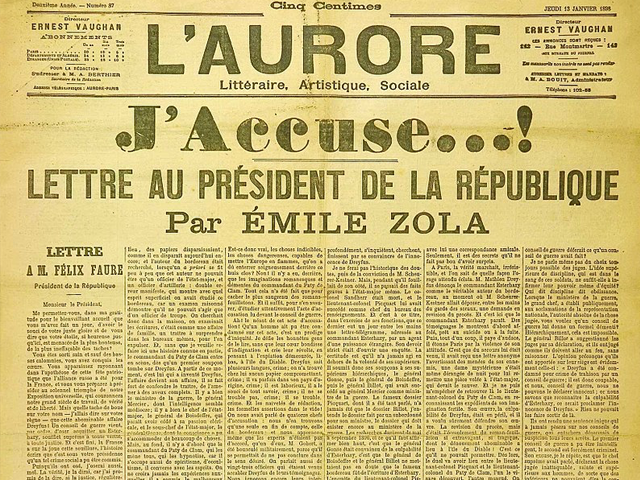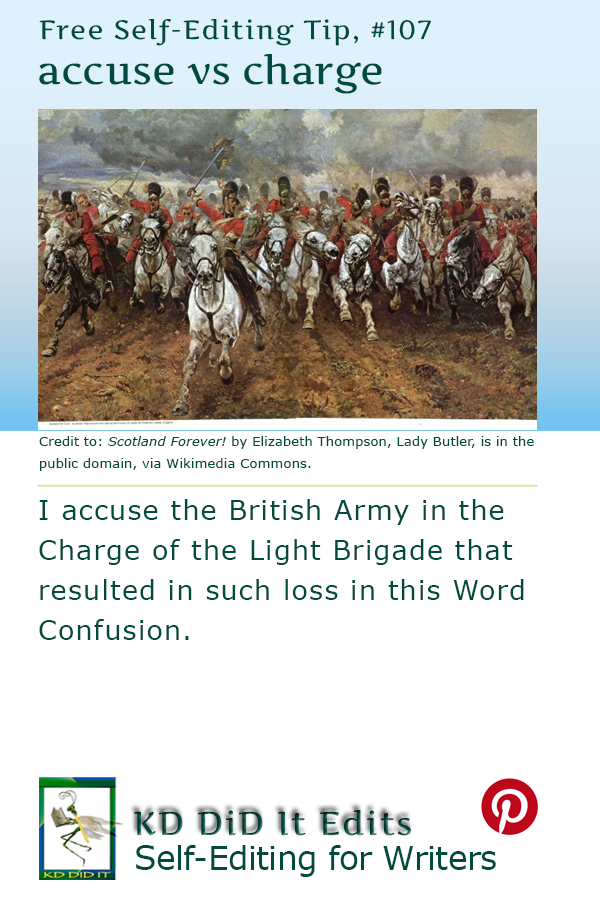I don’t remember what prompted me to explore the difference between accuse and charge, and I am surprised by how much “work” charge does. After all, accuse merely charges another, while charge may arrest, attack, purchase, price, or energize. Whew . . . I’ve run out of charge . . .
Exploring Later . . .
You may also want to explore the post “Accuse vs Allege vs Suspect” and/or “Allege versus Assert“.
Word Confusions . . .
. . . started as my way of dealing with a professional frustration with properly spelled words that were out of context in manuscripts I was editing as well as books I was reviewing. It evolved into a sharing of information with y’all. I’m hoping you’ll share with us words that have been a bête noire for you from either end.
If you found this post on “Accuse versus Charge” interesting, consider subscribing to KD Did It, if you’d like to track this post for future updates.
| Accuse | Charge |
|---|---|
 — |
 — |
| Part of Grammar: | |
| Verb, transitive
Third person present verb: accuses |
Noun 1 Verb 2, intransitive & primarily transitive Plural for the noun: charges Third person present verb: charges |
Charge someone with an offense or crime
|
Noun: A price asked for goods or services 1
An accusation, typically one formally made against a prisoner brought to trial The responsibility of taking care or control of someone or something
[Physics] The property of matter that is responsible for electrical phenomena, existing in a positive or negative form
[Singular; informal] A thrill [Firearms, Gunnery, Ordnance, & Artillery] A quantity of explosive to be detonated, typically in order to fire a gun or similar weapon
A headlong rush forward, typically one made by attacking soldiers in battle [Heraldry] A device or bearing placed on a shield or crest [Narcotics, 1920s] An injection of a narcotic Verb, intransitive: Store electrical energy in a battery or battery-operated device Rush forward in attack Verb, transitive:
Accuse someone of something, especially an offense under law
Entrust someone with a task as a duty or responsibility Store electrical energy in a battery or battery-operated device
[Heraldry] Place a heraldic bearing on |
| Examples: | |
| He was accused of murdering his wife’s lover.
He was accused of favoritism. What exactly are you accusing me of? She was accused of lying on the employment application. John plans to accuse you of bribery. She threatened to accuse of rape! |
Noun: There is an admission charge to see the paintings. An asset of $550,000 should have been taken as a charge on earnings. He appeared in court on a charge of attempted murder. Three people were arrested but released without charge. The prosecution dropped the charges for lack of evidence. The evidence shows beyond a reasonable doubt that the defendant engaged in that behavior, and the accused has no defense to the charge (Leipold, 253). The people in her charge are pupils and not experimental subjects. The babysitter watched over her charges. She is your ward, your charge, until she comes of age. That battery needs a charge. Neutrons are particles that have no electric charge and are slightly more massive than protons. I get a real charge out of working hard. What kind of ol’ creep’d get a charge out of this stuff? There are two kinds of charge: color charge and electric charge. What kind of charge does that cannon need anyway? The charge of the Light Brigade was doomed. The family shield includes a charge of three lions. Verb, intransitive: Can you charge this battery? The plan is to charge headlong at the enemy. The Light Brigade charged forward in a futile attack at the behest of incompetent commanders. Henry charged up the staircase. Verb, transitive: He charged me 2 euros for the postcard. They charge the calls to their credit-card accounts. They were charged with assault. Opponents charged that below-cost pricing would reduce safety. The committee was charged with reshaping the educational system. The shaver can be charged up and used while traveling. Will you see to it that your glasses are charged? The air was charged with menace. It includes a pennant argent, charged with a cross gules. |
| Derivatives: | |
| Noun: accused, accuser, accusing | Adjective: chargeable, charged, chargeless, self-charging, well-charged Noun: chargee, large charge |
| Phrasal Verb | |
| carrying charge charge off charge up charge with free of charge get a charge out of in charge in charge of in the charge of prefer charges press charges take charge |
|
| History of the Word: | |
| Its first known use was in the 14th century.
Middle English from the Old French acuser, which is from the Latin accusare meaning call to account from ad- (toward) + causa (reason, motive, lawsuit). |
Middle English in the general senses of to load and a load from the Old French:
both of which are from the late Latin carricare or carcare meaning to load from the Latin carrus meaning wheeled vehicle. |
C’mon, get it out of your system, bitch, whine, moan . . . which words are your pet peeves? Also, please note that I try to be as accurate as I can, but mistakes happen or I miss something. Email me if you find errors, so I can fix them . . . and we’ll all benefit!
Satisfy your curiosity about other Word Confusions on its homepage or more generally explore the index of self-editing posts. You may also want to explore Book Layout & Formatting Ideas, Formatting Tips, Grammar Explanations, Linguistics, Publishing Tips, the Properly Punctuated, Writing Ideas and Resources, and Working Your Website.
Resources for Accuse versus Charge
Some of these links may be affiliate links, and I will earn a small percentage, if you should buy it. It does not affect the price you pay.
Apple Dictionary.com
Dictionary.com: charge
The Free Dictionary.com: charge
Leipold, Andrew D. “Rethinking Jury Nullification.” Charlottesville: Virginia Law Review 82-2, 1996: 253-324. Print.
Pinterest Photo Credits
Scotland Forever! by Elizabeth Thompson, Lady Butler, is in the public domain, via Wikimedia Commons.
Revised as of 17 Oct 2022
By: Kathy Davie

